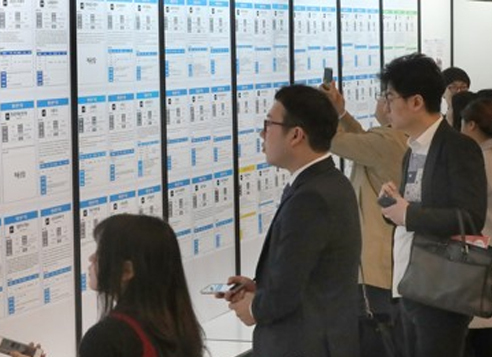South Korea's small and medium-sized enterprises are chronically short of workers, but the unemployment rate among the young is at a record high, indicative of a serious labor market mismatch in the country, economic analysts said Monday.
Foreign workers have long been filling jobs shunned by South Koreans as being too hard and underpaid. Even after being hired, many do not stay for long, increasing personnel management costs for businesses that have to repeat new hirings and job training.

A recent poll by the Korea Small Business Institute showed 80.5 percent of SMEs are having a hard time finding workers. But this isn't from a lack of available workers. The jobless rate among people aged 15-29, the youth segment, hit 11.2 percent in April, the highest for the month since record keeping began in June 1999.
The increase in foreign workers attests to such a mismatch. The number of foreigners coming to South Korea on work-related visas increased from 479,000 in 2012 to 549,000 last year. According to SMEs, the more serious problem is workers quiting their posts.
A study by the Ministry of Employment and Labor said the rate of job changes showed a 0.7 percentage point difference between conglomerates and SMEs in 2010. Last year, it doubled to 1.5 percentage points.
"It's hard to find workers. Even if we do, 80 percent of them quit after a year or two," an SME chief, identifying himself only by his last name Lee, said of his design company's situation. "It doesn't seem enough that we give more than other companies in the same industry."
Another SME chief Kim, who runs a ship towing firm, said local workers are just not interested in jobs with harsh working conditions. "It's extremely difficult to find workers because they think this is hard work, requiring different hour shifts," he said.
"People used to work even at nights to get overtime pay. But these days, the trend is to enjoy life rather than chase after money. The workers go home at 5."
For Kim's company, the cost of personnel management rises every time a worker leaves because of job training for new entrants.
"It's frustrating," said Kim.
The workers have complaints of their own.
Just hired by a small venture firm a couple of weeks ago, a female employee is already looking for another job. "The pay is low, there is no welfare program, and the company owner is clueless about basic labor laws," she said, withholding her name. "The only compensation for working overnight is a pep talk saying 'Let's try just a little bit more.'"
She in theory works 20 days a month, but says the workload is too heavy to finish within that period. The pay is 70,000 won ($62.33) a day, or about 1.4 million a month, before taxes.
"Of course, job seekers prefer to work for big conglomerates.
Work is equally hard at conglomerates and SMEs, but the conglomerates pay more," she said.
Her thoughts are shared by many young people. A survey in September by the Federation of Korean Industries showed that 32.3 percent of the 3,461 polled university students nationwide wanted to work for a big company. Another 25.4 percent preferred state-run institutions. Only 5.3 percent said they wanted to work at an SME.
Proposed solutions from economic analysts emphasize closing the gap between conglomerates and SMEs.
"The most fundamental means to addressing youth unemployment is to improve the job characteristics of SMEs -- low pay, lack of growth potential, work inequality -- through policy, systemic and legal tools," Prof. Choi Byoung-gil of Incheon National University said.
Prof. Lee Byoung-hoon of Chung-Ang University wants to see an overhaul of the economic mechanism that he says currently revolves around conglomerates.
"Workers will not avoid SMEs if they are guaranteed a future with enough to live on, even if not on par with conglomerates or SMEs of advanced countries," Lee said. "We need to break the unfair practices in the labor market."
The government should evaluate its current policies to see if they really are effective, the scholar said, a point that Lee, the design company CEO, fully agreed with.
"A company needs to make more profits in order to be able to pay more," the CEO said. "But SMEs live on subcontracts with conglomerates. Improving its profits is nearly impossible.
"It's well that the government provides assistance funds to SMEs, but it has to engage in policies that will change the present structure where SMEs are subordinated to conglomerates." (Yonhap)







![[Graphic News] Number of coffee franchises in S. Korea rises 13%](http://res.heraldm.com/phpwas/restmb_idxmake.php?idx=644&simg=/content/image/2024/05/02/20240502050817_0.gif&u=)









![[Eye Interview] 'If you live to 100, you might as well be happy,' says 88-year-old bestselling essayist](http://res.heraldm.com/phpwas/restmb_idxmake.php?idx=652&simg=/content/image/2024/05/03/20240503050674_0.jpg&u=)
